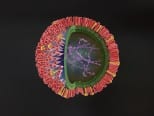 The latest study from CaHRU is published online in Vaccine this month. The study, ‘Influenza vaccine and risk of stroke: self-controlled case series study‘, was co-authored by Dr Zahid Asghar and Professor Niro Siriwardena from CaHRU together with Carol Coupland, professor of medical statistics at Nottingham University. The study used a self-controlled case series design with data from the General Practice Research Database (GPRD) on adult patients aged 18 years and above with fatal or non-fatal stroke during 8 years from September 2001 to May 2009.
The latest study from CaHRU is published online in Vaccine this month. The study, ‘Influenza vaccine and risk of stroke: self-controlled case series study‘, was co-authored by Dr Zahid Asghar and Professor Niro Siriwardena from CaHRU together with Carol Coupland, professor of medical statistics at Nottingham University. The study used a self-controlled case series design with data from the General Practice Research Database (GPRD) on adult patients aged 18 years and above with fatal or non-fatal stroke during 8 years from September 2001 to May 2009.
 Statistical analysis was used to compute incidence of stroke after flu vaccination compared with incidence during a baseline period in almost 18000 people who received one or more influenza vaccinations and experienced a first stroke during the observation period. The incidence (incidence rate ratio: IRR) of stroke was significantly reduced in the first 59 days following flu vaccination compared with the baseline period. We found reductions in stroke incidence of 55% in the first 1–3 days after vaccination, 36% at 4–7 days, 30% at 8–14 days, 24% at 15–28 days and 17% at 29–59 days after vaccination. Early vaccination between 1 September and 15 November was associated with a greater reduction in incidence of stroke compared to later vaccination given after mid-November.
Statistical analysis was used to compute incidence of stroke after flu vaccination compared with incidence during a baseline period in almost 18000 people who received one or more influenza vaccinations and experienced a first stroke during the observation period. The incidence (incidence rate ratio: IRR) of stroke was significantly reduced in the first 59 days following flu vaccination compared with the baseline period. We found reductions in stroke incidence of 55% in the first 1–3 days after vaccination, 36% at 4–7 days, 30% at 8–14 days, 24% at 15–28 days and 17% at 29–59 days after vaccination. Early vaccination between 1 September and 15 November was associated with a greater reduction in incidence of stroke compared to later vaccination given after mid-November.
Flu vaccination was associated with a reduction in incidence of stroke, which confirms findings from previous studies showing possible protective effects of flu vaccination for both heart attack and stroke. This association needs further confirmation with experimental (randomised controlled) trials.
